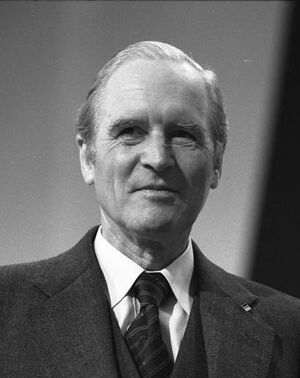Karl Carstens
( politician, civil servant) | ||||||||||||
|---|---|---|---|---|---|---|---|---|---|---|---|---|
 | ||||||||||||
| Born | 14 December 1914 Bremen, Germany | |||||||||||
| Died | 30 May 1992 (Age 77) Meckenheim, Germany | |||||||||||
| Nationality | German | |||||||||||
| Alma mater | • University of Frankfurt • University of Burgundy • University of Munich • University of Königsberg • University of Hamburg • Yale Law School | |||||||||||
| Spouse | Veronica Prior | |||||||||||
| Member of | Stauffenberg Service, US/Department/State/International Visitor Leadership Program | |||||||||||
| Party | NSDAP, Christian Democratic Union | |||||||||||
German politician and civil servant and one of the architects of the Treaty of Rome. He attended the 1971 Bilderberg as Head of the Chancellery, while at the same time part of the Stauffenberg Service, which conspired against his boss, Chancellor Willy Brandt. German President 1979-1984
| ||||||||||||
Karl Carstens was a German civil servant selected by the American occupying power to reach high positions. He was one of the architects of the 1957 Treaty of Rome, and attended the 1971 Bilderberg as Head of the Chancellery and a leader at the German Council on Foreign Relations. Carstens was part of the Stauffenberg Service, which conspired against his boss, Chancellor Willy Brandt. He ended his career as President of Germany 1979-1984.
Education
Carstens was born in the City of Bremen, the son of a commercial school teacher, who had been killed at the Western Front of World War I shortly before his birth. He studied law and political science at the universities of Frankfurt, Dijon, Munich, Königsberg, and Hamburg from 1933 to 1936, gaining a doctorate in 1938 and taking the Second Staatsexamen degree in 1939.
He joined the Nazi SA paramilitary organisation in 1934. In 1940 he joined the NSDAP; reportedly, he had applied for admission in 1937 to avoid detrimental treatment when he worked as a law clerk.
From 1939 to 1945, during the Second World War, Carstens served as a member of an anti-aircraft artillery (Flak) unit in the Luftwaffe, reaching the rank of Leutnant (Second Lieutenant) by the war's end.
He began his career in 1945 as a defense lawyer at the Military court of the American occupying power and then joined the law firm Ahlers & Vogel. In addition, from June 1945 to 1947, Carstens worked as a legal assistant for Mayor and Senator of Justice Theodor Spitta (BDV, later FDP). Through the mediation of employees of the American Military Court, Carstens was selected to receive a scholarship to study at Yale University in 1948, which he finished in 1949 with the degree Master of Laws.[1]
Post-war career
From 1950 he also worked as lecturer at the University of Cologne, where he habilitated two years later. In 1954 he joined the diplomatic service of the German Foreign Office, working as West German representative at the Council of Europe in Strasbourg. Three years later he was one of the architects of the Treaty of Rome, which established the European Economic Community. [1] He joined the Christian Democratic Union (CDU) under Chancellor Konrad Adenauer in 1955.
In July 1960 Carstens reached the position of secretary of state at the Foreign Office and in the same year was also appointed as professor for public and international law at University of Cologne. During the grand coalition government of 1966-1969 under Chancellor Kurt Georg Kiesinger, he first was secretary of state in the Ministry of Defence, and after 1968 as head of the German Chancellery.[1] From 1970 to 1972 he also headed the Research Institute of the German Council on Foreign Relations in Bonn.
In 1972 Carstens was first elected into the Bundestag, of which he was a member until 1979. From May 1973 until October 1976 he was chairman of the CDU/CSU parliamentary group, succeeding Rainer Barzel. During that time he was an outspoken critic of left-wing tendencies in the German student movement and particular accused the governing Social Democratic Party of Germany (SPD) of being too soft on left-wing extremists. He also famously denounced the author and Nobel laureate Heinrich Böll as a supporter of left-wing terrorism (specifically, the Baader-Meinhof group) for his 1974 novel The Lost Honour of Katharina Blum.[2]
After the 1976 election, which made the CDU/CSU the largest group in parliament, Carstens was elected president of the Bundestag on 14 December 1976. The CDU/CSU had also reached a majority in the Federal Convention electing the President of Germany, and in 1979 the party nominated Carstens, though contested due to his Nazi past, as candidate, whereafter incumbent President Walter Scheel (FDP) chose to renounce a second term.
Event Participated in
| Event | Start | End | Location(s) | Description |
|---|---|---|---|---|
| Bilderberg/1971 | 23 April 1971 | 25 April 1971 | US Vermont Woodstock Woodstock Inn | The 20th Bilderberg, 89 guests |